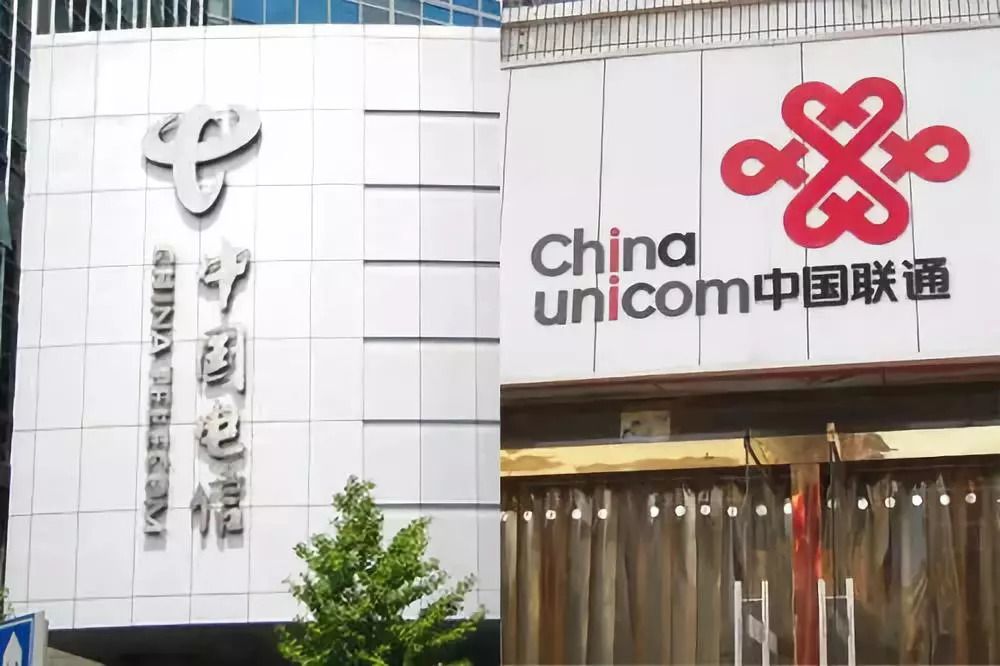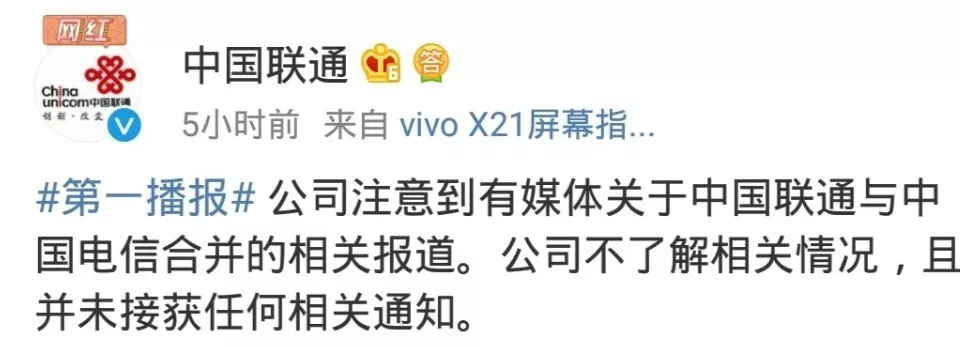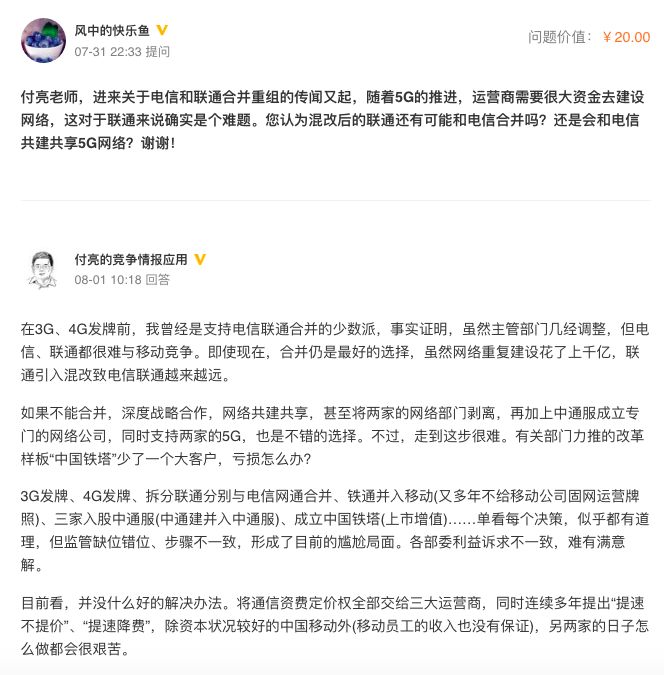
It was also rumored that China Telecom and China Unicom merged, and the two were busy refuting rumors.
China Unicom:

China Telecom:

Pay attention to the tone of the two parties, "not received any notice", "don't understand the situation."
It is necessary to refute rumors. If a company listed as the main operating entity has such a major change, it must be announced in advance. If there is no announcement, the interests of minority shareholders will be infringed. And it's not just China Unicom and China Telecom that will be affected. China Mobile, China Tower, and ZTE will also be affected. For example, as soon as the news spread, China Tower, which had just gone public and had a low stock price, had another big drop.
In July, I answered the question of the netizen "Happy Fish in the Wind" in the "Weibo Q&A", and now some netizens spend money to watch. The answer at that time was very simple, here is a more comprehensive review.

Question 1: Why would anyone propose the merger of China Telecom and China Unicom?
1. Before the issuance of 3G, the six major operators were integrated into three full-service operators. The licensing of 3G and 4G, as well as fixed network licenses, inter-network settlement fees, etc. have also been tilted to varying degrees, but so far , Did not form the “three-point world situation†imagined by the reorganization plan before the 3G licensing. Not only did China Mobile’s leading advantage not weaken, but strengthened, from “dominant one family†to “one ride in the dust†(I The view has been widely adopted and disseminated). At present, China Mobile has more mobile phone users than the two competitors combined. The number of weak wired broadband users has far surpassed China Unicom, and is approaching the leading China Telecom, and it accounts for more than 80% of the profits of the company.
2. 5G is about to be commercialized on a large scale, and high-quality frequency band resources are more in short supply. At the same time, the three major operators have to adopt higher frequency bands, which makes 5G network construction costs much higher than 4G. Among the three major operators, with the exception of China Mobile, the other two are struggling to build networks.
Question 2: Why is it now?
1. my country's 5G will be commercialized on a large scale next year. Before that, operators will need to determine what frequency bands they will obtain, and operators will also begin planning 5G networks to prepare for comprehensive network construction. If you want to adjust, it should be as soon as possible.
2. The six positions at the top of the three major operators have vacancies and some are on the verge of retirement. They have not been adjusted. If they are merged, two positions can be reduced.
3. When relevant meetings and documents of the State-owned Assets Supervision and Administration Commission mentioned reorganization many times, the list included communications. There have been rumors recently that a higher-level discussion of the merger of the two (not what I said, if I knew it, I would not say that I would kill it, this is intelligence discipline).
Question 3: What are the main obstacles to the merger?
1. The competition between three companies is more effective than two. At present, some countries have three major operators (such as Japan, South Korea...). This is also the view of the communication circle, and it is also important to choose the "6 in 3" solution during the last reorganization. the reason.
2. Repeated investment of hundreds of billions. China Unicom and China Telecom have made a lot of repeated investment in mobile and fixed networks, especially the 3G and 4G networks that currently account for the majority of users. The two major operators have built complete networks. If merged, the new company will have two 3G networks and Two 4G networks, and most of the investment has not been recovered.
3. Strengthened fixed-line monopoly. Due to the high requirements for the last one hundred meters, fixed networks (including wired phones and broadband) are more "natural" monopoly than mobile communication networks. If China Unicom and China Telecom merge, this will split China Telecom into "Southern China" in history. "Telecom + Beijing Netcom" is "wasted" efforts to intensify competition in the fixed network.
4. Many of the current policies are based on the competition of three operators. If two are merged and one is reduced, the effect of the policy will be greatly reduced, or even eliminated.
A typical example is the China Tower, which was originally designed to serve three companies at the same time by increasing the sharing rate. If the three companies become two and there is one less customer, the sharing rate will drop significantly and the tower revenue will also decline. And China Tower has just gone public in Hong Kong. Moreover, after the merger of China Telecom and China Unicom, its stake in the tower will surpass China Mobile in one fell swoop, and the board of directors will have a significant increase in the right to speak. This clearly conflicts with the purpose of establishing China Tower.
In addition, China Unicom's "mixed reform" purpose was originally to become bigger and stronger to compete with Telecom Mobile. If China Telecom and China Unicom merge, the shares of those "partners" in the mixed reform will be diluted, and the effect of the mixed reform will mostly disappear.
Question 4: If China Telecom and China Unicom do not merge, can they jointly build a 5G network?
If a 5G network is jointly built, China Telecom and China Unicom will pay two levels of "rents" for the use of the network. The first level will be paid to the network company, and the network company will also pay the tower rent to the tower company. The interest relationship will be more complicated. At the same time, the "virtual shell" of China Telecom and Unicom will increase communication costs and reduce efficiency. Moreover, from a supervisory point of view, it is far more difficult to supervise such a consortium of interests than it is for an independent company.
Question 5: If China Telecom and China Unicom merge, who will be the beneficiaries and whose interests will be harmed?
Those who lose interest:
China Tower, whose most direct benefit was damaged, changed from three customers to two.
The second benefit is ZTE. China is the most important network equipment market in the world. If the three operators merge into two, the network equipment purchases will decline, and the share will be further concentrated to Huawei, Ericsson, and Nokia. ZTE, which is highly dependent on the market, will suffer.
Other upstream network equipment suppliers whose main customers are the three major operators will also be affected to varying degrees.
The unclear benefits impact include:
China Mobile. With one missing competitor, it will take time for the remaining competitor to integrate. However, the strength of the competitor is increasing, and it is currently difficult to judge whether the profit impact is negative (although it is likely to be a positive impact for China Mobile, which has strong funds).
Strategic partner of China Unicom's "mixed reform". There were such big changes in the early stage of the "mixed reform", which is not necessarily a good thing, but if it remains the same, China Unicom will still be the "small third" in the industry, and strategic cooperation opportunities are also limited. The merger may bring new opportunities. Even from a financial point of view, if the stock price can rise a little, investment income will improve.
Mobile phone users. The three companies are beneficiaries during fierce competition, but the previous fierce competition is basically in the market below the province and city. After the cancellation of domestic roaming fees for voice and traffic, the voice of the provincial and municipal companies will decline, and the degree of competition will be weakened. The national policy of "speeding up and reducing fees" will continue.
Industry regulatory authorities. The environment has changed, some problems have disappeared, and some new problems have emerged. It is hard to say the extent of the impact, but doubts about the market economy and high tariffs will continue and may be further strengthened.
Obvious beneficiaries: Not found.
Question 6: If China Telecom and China Unicom merge, what suggestions do you have?
Suggestion one, if you merge, the sooner the better.
Recommendation two, 5G licenses should be issued to radio and television, focusing on the construction of multimedia broadcasting services based on mobile broadband in the 700MHz frequency band (at the same time public service licenses are also issued), and give play to the role of the 700MHz high-quality frequency band.
If you think the communication headlines are good, please press and hold the following QR code to follow. If you repost or like at the end of the post, it is a great encouragement to us! Welcome to provide valuable news and clues in the communications industry, and 50-500 yuan cash rewards will be given for adoption!
Portable energy storage power Stastion
SHENZHEN CHONDEKUAI TECHNOLOGY CO.LTD , https://www.szsiheyi.com